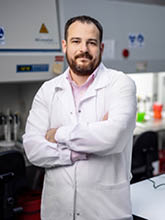Tuesday, 27th of January at 1:15 pm – 1:55 pm
Chair:

Marcin Poręba
Department of Chemical Biology and Bioimaging, Faculty of Chemistry, Wroclaw University of Science and Technology, Wroclaw, Poland
The application of chemical probes for imaging protease and kinase activity in tumor cells by mass cytometry.
Enzyme probes are small molecules that report catalytic function rather than expression. Activity-based probes (ABPs) combine a recognition element with a reactive “warhead” that forms a covalent adduct with the active site, while substrate-based probes are cleaved to release a reporter. Fluorescent probes have powered this field for decades, but spectral overlap limits multiplexing in complex samples. Mass cytometry enables high-dimensional single-cell profiling, but it largely reports protein abundance rather than enzymatic function. Our work brings these chemical biology tools to the CyTOF community by adapting them to lanthanide metal tags for suspension mass cytometry and to Hyperion imaging on tissue sections. In our work, we deploy metal-tagged inhibitor-based probes (called TOF-probes), providing direct, covalent readouts of active enzymes at single-cell resolution. Using this approach, we map the activity of cysteine cathepsins B, S, and L, as well as legumain, to define matrix-remodeling niches in cell-line models and in dissociated patient tumors. For cell death, a caspase-3 activity probe identifies apoptotic subpopulations that are missed by expression-only panels and that track with therapy exposure and response. Finally, neutrophil serine protease probes reveal activated neutrophils within PBMC cells and tumor samples. Finally, to expand our probe repertoire, we have recently developed metal-tagged kinase probes that directly label these enzymes in their active state. Moreover, our toolset integrates with metal-tagged antibodies, allowing us to monitor protease and kinase activity at single-cell resolution across defined cell subsets. So far we demonstrate significant potential to map tumor ecosystems focusing on enzyme activities, and within current research we are applying this approach to inflammatory disorders and neurodegenerative diseases.
Biosketch
Marcin Poręba (PhD, DSc) is the Head of the Department of Biological Chemistry and Bioimaging, and Vice-Dean of the Faculty of Medicine at Wrocław University of Science and Technology. He develops small-molecule, activity-based probes and metal-tagged reporters to quantify protease activity by mass cytometry (CyTOF) at single-cell resolution. His primary focus is protease imaging; more recently, his lab has begun developing metal-labeled probes for kinases. He pioneered coupling chemical probes with CyTOF, enabling multiparametric enzyme-activity mapping in immune cell subsets and tumors, and co-founded (2018, with Prof. Marcin Drąg) Poland’s first mass cytometry laboratory. An MSCA Global Fellow (2016-2018, SBP San Diego, Salvesen lab), he has authored 80+ papers (>3,000 citations; h-index 33). His group applies CyTOF-compatible probes to oncology, immunology and neurodegenerative disorders, and also engineers next-generation antibody-drug conjugates. A unique element of the ADC program is the use of protease-cleavable linkers that incorporate unnatural amino acids to improve selectivity and payload release.